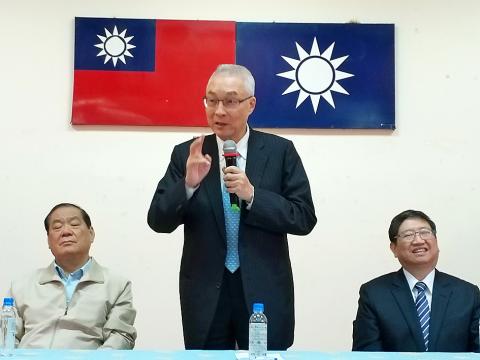Chinese Nationalist Party (KMT) Chairman Wu Den-yih (吳敦義) yesterday said that characterizations of the so-called “1992 consensus” by President Tsai Ing-wen (蔡英文) and Chinese President Xi Jinping (習近平) were incorrect.
On Wednesday, Xi said in a speech that Taiwan “must and will be” united with China based on the “1992 consensus” and under the “one China” principle.
He proposed a Taiwanese version of the “one country, two systems” model to achieve “peaceful unification.”

Photo: Liao Hsueh-ju, Taipei Times
In response, Tsai said she rejects the “consensus,” as its goal is “Taiwan’s unification with China.”
The “consensus,” as defined by Beijing, is in fact the “one China” principle and the “one China, two systems” formula, she said.
Wu said that the KMT’s definition of the “1992 consensus” involves the free interpretation of “one China” by either side and rejected Xi’s inclusion of the “one country, two systems” framework as part of the “consensus.”
“The free interpretation of one China is in fact the 1992 consensus,” Wu said.
Tsai’s denial of the existence of the “1992 consensus” is also wrong, he said.
The Straits Exchange Foundation (SEF), with the approval of then-president Lee Teng-hui (李登輝), who was also KMT chairman, exchanged documents with Chinese authorities on Nov. 16, 1992, in which the two sides agreed that “free interpretation represented the content of the 1992 consensus,” Wu said.
“The two sides of the Taiwan Strait, based on the one China principle, agreed that either side can freely interpret what one China means in a verbal form,” Wu said.
“This means that the mainland can claim that the People’s Republic of China represents all of China, while we can also claim that the Republic of China [ROC] represents the whole of China,” he said.
Based on that agreement, then-SEF chairman Koo Chen-fu (辜振甫) and Wang Daohan (汪道涵), chairman of China’s Association for Relations Across the Taiwan Straits, held talks in Singapore in April 1993, Wu said.
Separately yesterday, former New Taipei City mayor Eric Chu (朱立倫) of the KMT also came to the defense of the KMT’s stance regarding the “consensus,” saying that the “1992 consensus” and the “one China, two systems” framework are totally different things.
“The Republic of China has always adhered to the path of democracy and freedom, and will surely do so in the future,” Chu said, adding that to the KMT, a free interpretation that the ROC represents all of China is the party’s stance toward the “1992 consensus.”
Chu, who left office last month, has announced a bid to vie for the KMT’s nomination as its candidate in the next presidential election in early 2020.

A preclearance service to facilitate entry for people traveling to select airports in Japan would be available from Thursday next week to Feb. 25 at Taiwan Taoyuan International Airport, Taoyuan International Airport Corp (TIAC) said on Tuesday. The service was first made available to Taiwanese travelers throughout the winter vacation of 2024 and during the Lunar New Year holiday. In addition to flights to the Japanese cities of Hakodate, Asahikawa, Akita, Sendai, Niigata, Okayama, Takamatsu, Kumamoto and Kagoshima, the service would be available to travelers to Kobe and Oita. The service can be accessed by passengers of 15 flight routes operated by

Chinese spouse and influencer Guan Guan’s (關關) residency permit has been revoked for repeatedly posting pro-China videos that threaten national security, the National Immigration Agency confirmed today. Guan Guan has said many controversial statements in her videos posted to Douyin (抖音), including “the red flag will soon be painted all over Taiwan” and “Taiwan is an inseparable part of China,” and expressing hope for expedited reunification. The agency last year received multiple reports alleging that Guan Guan had advocated for armed reunification. After verifying the reports, the agency last month issued a notice requiring her to appear and explain her actions. Guan

GIVE AND TAKE: Blood demand continues to rise each year, while fewer young donors are available due to the nation’s falling birthrate, a doctor said Blood donors can redeem points earned from donations to obtain limited edition Formosan black bear travel mugs, the Kaohsiung Blood Center said yesterday, as it announced a goal of stocking 20,000 units of blood prior to the Lunar New Year. The last month of the lunar year is National Blood Donation Month, when local centers seek to stockpile blood for use during the Lunar New Year holiday. The blood demand in southern Taiwan — including Tainan and Kaohsiung, as well as Chiayi, Pingtung, Penghu and Taitung counties — is about 2,000 units per day, the center said. The donation campaign aims to boost

The Central Weather Administration (CWA) said a magnitude 4.9 earthquake that struck off the coast of eastern Taiwan yesterday was an independent event and part of a stress-adjustment process. The earthquake occurred at 4:47pm, with its epicenter at sea about 45.4km south of Yilan County Hall at a depth of 5.9km, the CWA said. The quake's intensity, which gauges the actual effects of a temblor, was highest in several townships in Yilan and neighboring Hualien County, where it measured 4 on Taiwan's seven-tier intensity scale, the CWA said. Lin Po-yu (林柏佑), a division chief at the CWA's Seismological Center, told a news conference